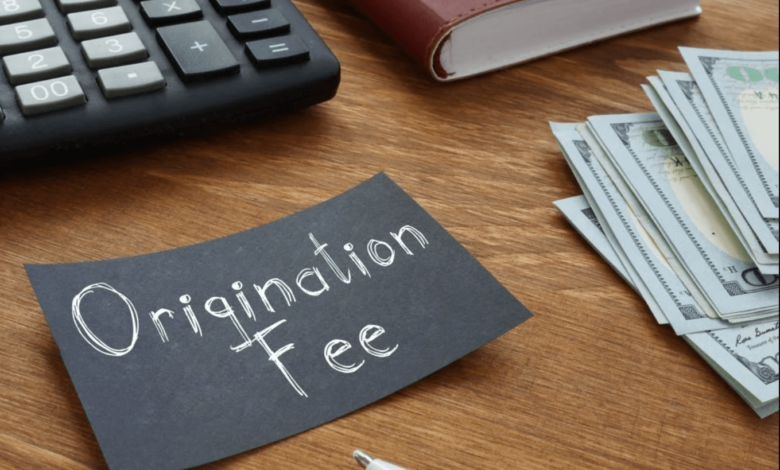
Learn All About What is an Origination Fee on a Loan?
When you’re looking into getting a loan, whether it’s for a mortgage, personal, or business purposes, one term you’re likely to come across is the “loan origination fee.” In this article, we’ll explain what is an origination fee on a loan, how it works, and why it matters to you as a borrower.
Understanding Loan Origination Fees
What is a Loan Origination Fee?
A loan origination fee is a one-time cost associated with the creation of a new loan. It is typically expressed as a percentage of the total loan amount. Processing costs of setting up the loan. Essentially, it’s the cost for the lender’s services in preparing and evaluating your loan application.
How is it Calculated?
Loan origination fees are calculated based on a percentage of the total loan amount. The percentage can vary from lender to lender, but it’s typically around 1% of the loan amount. For instance, if you are taking out a $200,000 mortgage, the loan origination fee might be around $2,000.
The Purpose of Loan Origination Fees
Loan origination fees serve several purposes. They help lenders recover the costs associated with processing and underwriting the loan application. Additionally, they act as a source of revenue for the lender. This fee can be a significant part of the lender’s income, especially for larger loans.
Where to Find Loan Origination Fees
Loan origination fees are typically disclosed on the loan estimate provided by the lender when you apply for a loan. Lenders are required to provide a Loan Estimate under the Truth in Lending Act, which aims to promote transparency in lending.
How Loan Origination Fees Affect Your Loan
Impact on Interest Rates
One thing to keep in mind is that loan origination fees are distinct from the loan’s interest rate. However, they can indirectly affect your interest rate. Borrowers who pay higher origination fees may be able to secure a lower interest rate on their loan, which can result in savings over the life of the loan.
Impact on Total Loan Cost
Loan origination fees are a cost that you need to factor in when determining the total cost of your loan. This includes not only the principal and interest but also any associated fees. It’s important to understand the overall cost of the loan to make an informed borrowing decision.
Negotiating Loan Origination Fees
In some cases, borrowers may be able to negotiate the origination fee with the lender. It’s worth discussing this option, especially if you have a strong credit history or are making a substantial down payment. Negotiating can potentially save you money upfront.
Types of Loans with Origination Fees
Not all loans come with origination fees, but they are common with certain types of loans. Mortgage loans, personal loans, and business loans are some examples where origination fees are frequently applied.
Regulations and Transparency
Truth in Lending Act
Clear and detailed information about loan terms, including origination fees. This regulation is designed to protect consumers by ensuring transparency in lending.
Other Regulations
Besides TILA, there may be state-specific regulations that affect origination fees. In your region to ensure that you are not being charged unfairly.
Alternatives to Loans with Origination Fees
You can explore loans that don’t charge them. Some lenders offer “no-fee” or “zero origination fee” loans. However, these loans may have slightly higher interest rates, so it’s essential to consider the overall cost.
Common Misconceptions
There are several misconceptions about origination fees, such as them being unnecessary or automatically included in every loan. It’s crucial to dispel these misconceptions and have a clear understanding of how origination fees work.
Pros and Cons of Loan Origination Fees
Before you decide whether to accept a loan with an origination fee, consider the pros and cons. While they can increase the upfront cost of borrowing, they can also potentially lead to long-term savings in the form of lower interest rates.
Tips for Borrowers
To make informed decisions regarding loan origination fees, consider your financial situation, negotiate when appropriate, and be aware of all the fees associated with the loan. Read more…
Conclusion
In conclusion, what is an origination fee on a loan is a one-time cost associated with the creation of a new loan. It is designed to cover the administrative and processing expenses incurred by the lender. Understanding origination fees and their potential impact on your loan can help you make better financial decisions.
FAQs
What is the average origination fee for loans?
The average origination fee for loans is typically around 1% of the total loan amount. However, it can vary from lender to lender and depending on the type of loan.
Can loan origination fees be waived?
In some cases, borrowers may be able to negotiate or have origination fees waived. It often depends on the lender and your financial situation.
Do all types of loans have origination fees?
No, not all types of loans have origination fees. They are more common with mortgage loans, personal loans, and business loans.
Are loan origination fees tax-deductible?
Origination fees are generally not tax-deductible. However, it’s essential to consult a tax professional for specific guidance.
How can I negotiate lower origination fees?
Negotiating lower origination fees may be possible by discussing the option with the lender, especially if you have a strong credit history or are making a substantial down payment. It’s worth exploring this possibility to save money upfront.



